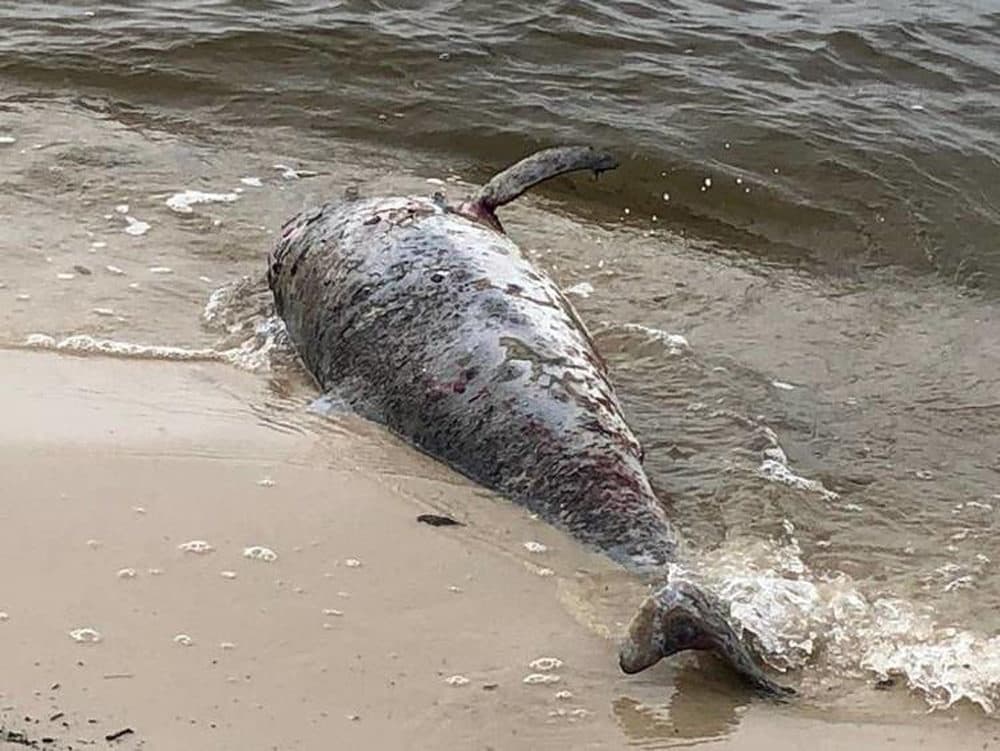Advertisement
Freshwater Flooding Is Threatening Marine Life In The Mississippi Sound

The opening of Louisiana's Bonnet Carre Spillway is alleviating swelling of the Mississippi River, but it's having adverse affects on marine life in the Mississippi Sound.
Officials opened the spillway to release some of the water that is flooding into the Mississippi River, but that water is wreaking havoc on marine life in the sound. Some 125 dolphins and more than 140 sea turtles have died so far this year.
Moby Solangi, president and executive director of the Institute for Marine Mammal Studies in Gulfport, calls the threat to marine life "unprecedented," and says the opening of the spillway is altering their habitat.
"We are getting trillions of gallons of river water, which is not just freshwater, it has all sorts of mud, clay, silt, all sorts of industrial agricultural and sewage waste from 31 states and two provinces in Canada," he tells Here & Now's Peter O'Dowd. "What it does is reduces the salinity of the water. It brings in lots of other pollutants into it that cause a significant change in the ecosystem."
Interview Highlights
On what happens when these animals come in contact with this freshwater
"Well I mean, these are top predators. We use dolphins as good biological indicators of the environment. They're just like a black box of an airplane. When they start being affected, you know, that's something in the entire ecosystem has changed. What we are seeing is that the blue crab fishery, this is the food that the turtles eat, has declined almost 35 [or] 40% or more. There's been a total loss of the oyster fishery. The oysters are the habitat for the blue crabs and so there's a chain reaction. The salinity, which is normally between 10 and 15 parts per thousand is now running at zero to five parts per thousand, mostly towards zero.
"And so when you have saltwater animals that are now exposed to literally freshwater, for example, in dolphins we are seeing very serious skin lesions, the sores then open up and the bacteria and the fungi and the viruses enter into the animal and make it sick. Now the jury is out on the turtles, but them being reptiles, they have scales on their body and you don't see visible effects, but because their diet may be changing, we may be seeing some physiological changes. We are going to be doing necropsy and pathologies and toxicologies to connect the dots."
Advertisement
On if the problem will clear up once the floodwaters recede
"Well, all of this was designed in the 1920s ... My question to you is how many people are driving 1920 cars? And so what we are seeing now is that the Bonnet Carre would be opened up every five or 10 years. Now in the last four years, it has opened three times and then this year — unprecedented in its 100-year history — it has opened twice. It's going to continue for a long period of time. Usually, it ends up in a two or three weeks and then things start getting back to normal. We do have an extreme environment, which can handle fluctuations, but not this persistent exposure."
On why closing the spillway won't solve the problem
"The problem we see is that Mississippi has never had a seat on the table. They never thought that these spillways or diversions would cause any issues to Mississippi. Our problem is, for example, they put all this water into Lake Pontchartrain, which is a huge body of water bigger than the Mississippi Sound, and that is in Louisiana so they felt that, 'OK, we'll just put it in our waters.' But then it opens up into the Mississippi Sound through a very narrow passageway. And even if they close the Bonnet Carre today, it'll be weeks and months before you see that exchange.
"Secondly, being at the dead end of the Gulf, there is no exchange of water as you see in the deeper waters. And so the water stagnates, it slowly is released, and this is a very long-term exposure. Now what do we do next? Of course, there are other spillways, the Morganza Spillway, that should be opened first if you want to look at strategy, but they want to protect the resources of Louisiana more so than Mississippi."
Ciku Theuri produced and edited this interview for broadcast with Todd Mundt. Samantha Raphelson adapted it for the web.
This segment aired on June 10, 2019.
